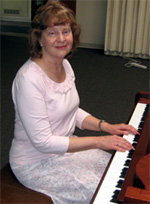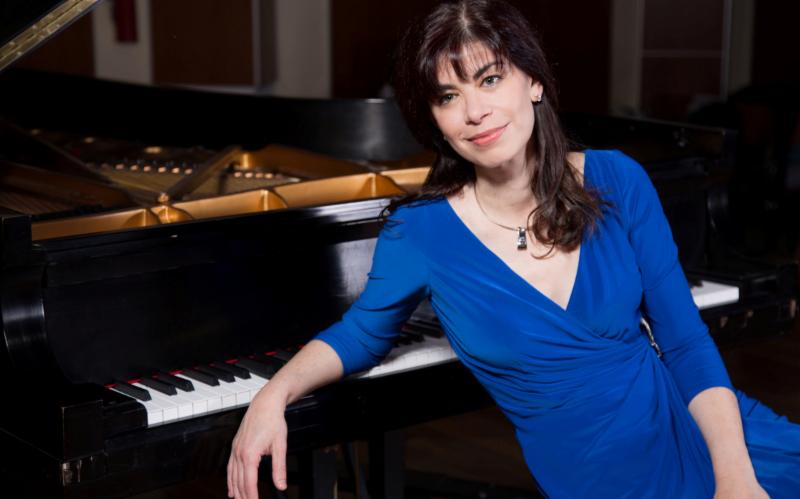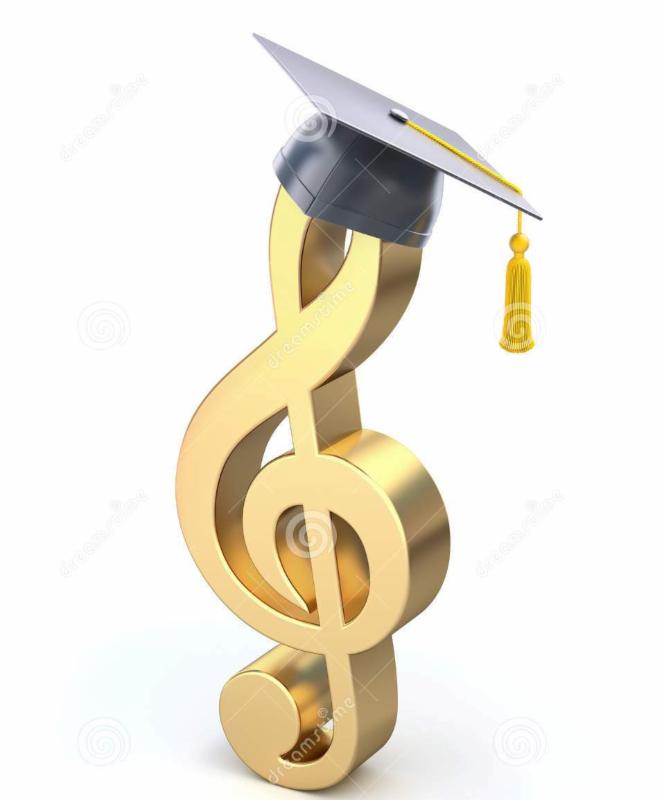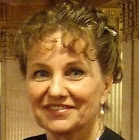|
Upcoming Events
FEBRUARY
PROGRAM:
Svetlana Belsky
"Ferruccio-Busoni's Bach: the birth of modern performance practice"
Monday, 2/19/018
Rolling Meadows Library
9:15 A.M. IMT (Independent Music Teachers) Chat
9:45 A.M. Meeting
MARCH
AIM: PERFORMANCE EXAMS LEVEL 3-9
Sunday, March 11, 2018
10-12 Performance Exams
MTNA NATIONAL CONFERENCE
Saturday-Wednesday, March 17-21, 2018
Lake Buena Vista, FL
PROGRAM:
IMT (Independent Music Teachers)
Laurie Sorman and Fran Onley
"Snappy Summer Ideas to Grow Your Income, Enrollment and Enjoyment"
Monday, March 19, 2018
Rolling Meadows Library
9:15 A.M. IMT (Independent Music Teachers) Chat
9:45 A.M. Meeting
|
|
|
|
|
|
|
A NOTE FROM OUR PRESIDENT

"It's never too late to learn to play the piano!" "Do your New Year's resolutions include taking music lessons?" These are quotes from radio advertisements that I heard last month. They started me thinking about one of the big growth segments in our profession, namely adult learners.
I imagine that, like me, those of you who have been teaching for a long time have had some adult students. Although children have always comprised the major part of my studio, I have had a few adult students from time to time. I generally enjoyed working with them and looked forward to having some adult conversation. However, I often found that they stopped lessons after a year or two. They either found that they were too busy with work and family to practice, or they became discouraged because piano proved to be more difficult than they had anticipated.
Recently I have had several adult students who are part of the growing number of empty nesters and baby boomers who are signing up for lessons. They do it for various reasons, including keeping their brain healthy, loosening up arthritic hands, or occupying spare time with a leisure activity. Leisure or recreational learners may be the wrong term for these adults because they are some of the hardest working students I have ever had! Below are profiles of two of them.
Mary came to me at the encouragement of her husband, who actually called to arrange lessons. She was about my age and had taken lessons as a child. By coincidence we were both originally from the same city, Tulsa, Oklahoma. Although other members of her family played the piano, Mary became convinced after her early lessons that she had little ability and could not learn to read music. We soon found that this could not be farther from the truth! She practiced diligently and became a very competent reader. She also was innately musical, had a good ear, and played very expressively as she became comfortable at the keyboard. She had a broad appreciation of different styles of music developed over a lifetime of listening, and would often surprise me with interesting insights and information. She had a real flair for jazz and especially enjoyed playing easy piano jazz and blues pieces. After Mary retired, she and her husband decided to move out of state, but she planned to continue taking lessons.
I am currently working with another adult, Paulette. Her daughter had studied piano for years, but when Paulette contacted her former teacher about lessons she told her that she won't teach adults because "I can't yell at them to practice." (??!!) That would certainly not be necessary in Paulette's case, as she practices every chance she gets. She was a complete beginner but flew through her first adult lesson book. She says that she loves playing the piano. I once remarked to her that I had found that adult beginners sometimes find piano too hard and quit lessons. Her response to that was to say that she loves a challenge and will work even harder when faced with something difficult. What a great attitude!
I have thoroughly enjoyed teaching my adult students and really admire their dedication. They come home from long days in an office and lengthy commutes and sit down to practice. They find relaxation as well as mental and physical challenge at the piano, and are motivated, as are we, by a love of music. I look forward to continuing to learn and grow along with them.
Suzanne Murray
|
|
SVETLANA BELSKY - "Ferruccio-Busoni's Bach: the birth of modern performance practice"

Critically acclaimed as "a passionate pianist and scholar," Svetlana Belsky is an in-demand recitalist and chamber pianist, noted for her remarkable rapport with audiences and stylistic versatility. She has appeared in the Ukraine, Russia, Poland, China, Taiwan and Hong Kong, and throughout the United States. Her performance credits include Carnegie Recital Hall, Kiev Philharmonic Hall, Dame Myra Hess Series, Music in the Loft, countless university concert series, live recitals on Chicago's WFMT and New York's WQXR, and guest appearances with the University of Chicago Symphony, Southern Illinois Symphony, Chicago Chamber Orchestra and the Tutti Orchestra.
Dr. Belsky's love for a wide variety of music has led her to play early music with original instrument ensembles, and receive awards for her interpretation of new American music. In the past few years alone, she has introduced, in world and local premieres, compositions by no fewer than a dozen living composers. She also appears regularly as a harpsichordist with the Chicago Syntagma Musicum Ensemble.
|
|
AWARDS COMPETITION and RECITAL DATE CHANGES !!!
Due to a conflict at Harper College the Awards Competition date has been changed to Sunday, April 15th.
Also, the date for the AWARDS Competition Winner's Recital was incorrectly listed in the yearbook and on the website.
The correct date is
Saturday, APRIL 21, 2018
Steinway Gallery, Northbrook
Recital is at
5:00 pm.
|
|
CAMP SCHOLARSHIP

If you have students that will be attending a music camp this summer, look into our camp scholarship requirements. The student can apply for the scholarship performing on any instrument taught by an NWSMTA teacher even if that is not the instrument they will be attending camp for. There are 2 divisions: Junior - up to 8th grade and Senior - 9th through 12 grades. 1st place winners in each division will each receive $300 and 2nd place winners will each receive $200. For more information and application form look on our website at NWSMTA.org. If you have any questions, please contact me. If sending an email, please state camp scholarship in the subject line. Deadline is
April 15.
Pat Borchardt
|

If you have a high school senior graduating this year and will be attending a college or university majoring in music, remember about our college scholarship. There will be 1 winner receiving $1000 payable to the school in 2 installments. All pieces must be memorized. They must apply on the instrument taught by a NWSMTA teacher and majoring on that instrument. Application form and rules and requirements are listed on our website at NWSMTA.org. If you have more questions, please contact me. If sending an email, please state college scholarship in the subject line. Deadline is
April 15
.
Pat Borchardt
|
|
ACCOMPANIST NEEDED
1st Presbyterian Church of La Grange, needs an accompanist to play the piano for rehearsals, 4 times a month, at $90.00 a rehearsal, and also to play in services (9:30 & 11:00) when the choir needs piano accompaniment and for the Praise Team. That would be negotiated and could become a staff position.
The choir director's name is Jason Fahrenbach and can be reached at [email protected]
|
|
AIM THEORY LEVELS 5-12 RESULTS
The AIM Theory exams for levels 5 through 12 were held on January 28th. 213 Students from 40 teachers participated. Below is a summary of the exam scores.
|
Low |
Average |
Median |
High |
|
# Students Judged |
| Overall |
56.00 |
90.46 |
92.50 |
101.00 |
|
213 |
|
|
|
|
|
|
|
| L12 |
67.50 |
91.04 |
93.13 |
97.50 |
|
18 |
| L11 |
78.00 |
86.15 |
85.00 |
94.00 |
|
13 |
| L10 |
68.50 |
87.23 |
88.88 |
96.50 |
|
16 |
| L09 |
77.50 |
94.11 |
95.75 |
100.00 |
|
28 |
| L08 |
66.00 |
89.54 |
92.50 |
101.00 |
|
32 |
| L07 |
84.00 |
93.36 |
93.75 |
100.00 |
|
34 |
| L06 |
61.50 |
90.10 |
91.38 |
100.50 |
|
32 |
| L05 |
56.00 |
88.89 |
91.38 |
98.50 |
|
40 |
|
|
Dr. William A. Kinderman Workshop
|
|
INVITATION TO PRESENTATION BY DR. BARBARA SCHUBERT
You are invited to a presentation by Dr. Barbara Schubert, Conductor of the DuPage Symphony Orchestra.
on
Thursday, 1st March, 9:30 A.M. at Trinity Episcopal Church, 130 N. West Street, Wheaton.
(1 Block immediately North of Wheaton Metra Station.)
Dr. Barbara Schubert
"Music as our Mission: Programming and Performing for Impact"
As conductor of the DuPage Symphony Orchestra, Dr. Schubert has proven to have staying power long beyond her entrances. Schubert has been described as "an archivist and scholar as well as a conductor," stating that one of her joys of conducting for that the work is never finished. "You're always striving," she says, "to understand more about the piece of music. You're always striving to achieve greater polish. You're always striving to be more effective, to be more inspiring to your musicians. To get closer to the essence of the art."
Arriving at the Univ. of Chicago in 1
976, Dr. Schubert soon became the conductor of the Univ. of Chicago orchestra, shaping it in ways "that reflect her combination of a brilliant intellect and consummate musicality." Dr. Schubert's purpose from this early time was always "to foster ... a lifelong commitment to music,...and to appreciate...and support...music."
Schubert has studied conducting with Herbert Blomstedt, Otto-Werner Meuller, Thomas Briccetti, Charles Bruch, and Iva Dee Hiatt. She also participated in many professional conducting workshops, such as those with maestros Max Rudolf and Pierre Boulez. As Winner of the 1982 American Conductors Competition, Barbara Schubert served two seasons as Asst. Conductor of the Colorado Philharmonic Orchestra. In the summer of 1985 she was selected for the Tanglewood Seminar for Conductors, where she studied with Seiji Ozawa, Leonard Bernstein, Kurt Mazur, and Gustav Meier.
Dr. Schubert has been consistently featured and accoladed with "consistently high artistic standards, her energetic podium style, and her innovative programming". She was named the 2003 "Conductor of the Year" by the Illinois Council of Orchestras. Dr. Schubert has guest conducted numerous professional ensembles in the Chicago area, including the Grant Park Symphony, the Contemporary Chamber Players, the Lyric Opera Center for American Artists, the Chicago Youth Symphony Orchestra, the Oak Park Symphony, the Chicago Camerata, and Light Opera Works. Recent guest conducting engagements include the Birmingham Opera Theater (AL), the Fairbanks Symphony Orchestra (AK), the Santa Cruz County Symphony (CA), the Fargo-Moorhead Symphony (ND), the Fox Valley Symphony (WI and IL), the Bay Area Women's Philharmonic (IN), the Lafayette Symphony Orchestra (IN) and the Northwest Indiana Symphony.
She has an extensive repertoire, consisting of over 1,100 performed works, including twentieth-century music and many full operas. Barbara Schubert recently completed a two-year term as President of the Conductors Guild, an international service organization of nearly 2,000 members that is dedicated "to encouraging and promoting the highest standards in the art and profession of conducting". Known throughout the Chicago area as an orchestra builder, she has dramatically increased both the quality and the scope of the symphony orchestras she directs. A champion of new music, Ms. Schubert has conducted a large number of world premieres with both amateur and professional ensembles, and has introduced a wide assortment of unusual repertoire and collaborative events to Chicago audiences.
|
|
NOTE FROM THE EDITOR

Northwest Suburban is fortunate and thankful to have CODA (Compositions Online Database Access). Teachers using AIM are not the only people to benefit from this resource. It is located under the AIM section of our own website. Just a login is required. If you have forgotten you login information, go to the CODA login HELP page. Select your name from the drop down list. You will receive an email with your login information.
CODA can assist you in planning upcoming repertoire for your students. It will offer sources (books and collections) for the pieces listed. You can search by period, composer and level for suggestions of pieces that meet your criteria.
If you have students preparing for AIM, it is a good idea to check out the repertoire you are considering. OPERA (Online Piano Exam Registration for AIM) will allow you to plan repertoire for individual students, make you aware of any pieces that need special approval and alert you to any selections that will not meet the criteria for the student's AIM level. It is so much better to have a "heads up" early rather than later.
Recently, more improvements have been made to CODA and OPERA. I am told by my "programmer" that software is never finished. There's job security! But I'm reminded that when we teach or study a Beethoven sonata, there's always another layer of discovery beneath what you have so far achieved.
CODA Improvements
'Omit Books + Collections' is now available in Search Options. This is useful when you want to determine the assigned level of a solo composition piece. A collection might cover several levels and you would not be aware of which level the piece you're interested in is placed at.
'Show Table of Contents' is now available in Search Options or by clicking on any Book or Collection title colored red in any search result. Instead of displaying the compositions in a Book or Collection from all Levels, just a Table of Contents is displayed. I have used this feature in preparing the program for my recitals or looking up the name of a movement for the Sonata Festival.
In addition to entering 'A' for baroque, 'B' for classical, 'C' for romantic and 'D' for contemporary, you can now enter the period name directly: 'baroque', 'classical', 'romantic', and 'contemporary' or 'modern'. A shortcut is to just type the first 3 letters of the period: 'bar', 'cla', 'rom', 'con' or 'mod'.
'I' or 'Impressionism', 'T' (for 20th and 21st Century), and 'X' (for Unclassified) were added to refine musical period searches. Shortcuts are: 'imp', '20' or '21' or 'twe'.
Composer search was improved so that a search for 'JS Bach' will find listings entered as 'Bach, J.S.'
If no results are found with the entered search terms, Coda will automatically search again correcting any misspellings of the Composer, Composition, Editor or Book/Collection. If results are still not found, Coda will automatically search again allowing other Composers, Levels, Books, etc in the results.
A tip that may help if you achieve less results than expected, is to start with a broader search. Try using only the composer and composition to begin. If you have too many results narrow your search further. Most incomplete results come from being too specific.
Most errors in searches are due to mispellings, misspelings, messpillings, misspellings. YIKES!
OPERA Improvements
A new section labeled 'Theory entries that are not yet registered for Performance' provides a list of your students that were registered for the Theory exam and need to registered for the Performance exam. By clicking on the 'Start Registration' button, the student's name and level will be placed in the 'New Student Entry' form.
A new section labeled 'Printable Student Summary' provides all available information for each of your entered students in a printable format. Each student is printed on a separate page. In the printing dialogue box you can select whether to print all pages or just a single page/student.
Level 12 Performance program approval documentation can now be entered during the exam registration. If you are not pasting a copy of the approval email, just enter a statement saying that the approval is being sent to the exam chair.
Previously a teacher could update their work time request but not delete it. Now, if the teacher has no students entered or has deleted all entered students, the teacher may remove their work time request.
When submitting a new student, already registered students are checked to prevent duplicate entries.
A big thank you to all our volunteers, both within the organization and those who are "friends" of the organization. What would we do without help from our spouses, children, siblings, in-laws, out-laws, students and their families? We would not be NWSMTA.
Deborah Lynch
|
|
| |
|